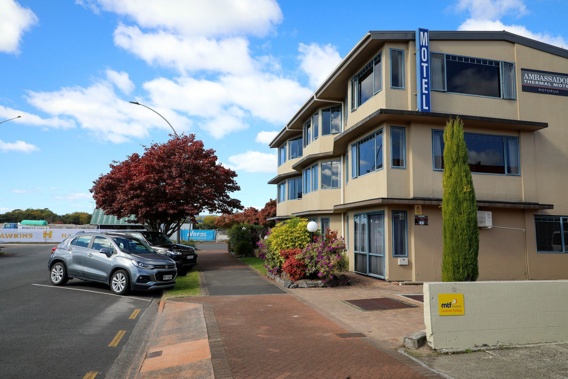
Some New Zealand hotels are offering guests discounts or vouchers to service their own rooms because staff from overseas are in such short supply.
And hospitality industry leaders say unless more overseas workers can be found promptly, the country risks reputational damage.
"There is a severe shortage of entry-level hotel workers in New Zealand and especially so in Queenstown," Hotel Council Aotearoa strategic director James Doolan said.
"The reasons stem from Covid, because in the first 12 months following border closures, the overnight accommodation sector lost more than half of its workforce."
He said some hotels had reduced cleaning from daily to once every three days. Others had closed services such as spas or cut back on dining and room service.
Guests might be compensated with a voucher, free drink or other benefit, he said.
"The problem is, you need flexible workers ... Young people who don't have kids often, who are travelling overseas on the trip of a lifetime."
Doolan said the Government had required staff in the Accredited Employer Work Visa scheme to be paid not the minimum hourly wage of $21.20 but the median wage, $27.76.
That was amended to $25 an hour for specific construction, infrastructure, tourism and hospitality jobs.
/cloudfront-ap-southeast-2.images.arcpublishing.com/nzme/J4CXIFNZ45KR6COP3EE5DLNCCU.jpg) Erica Stanford, National Party immigration spokeswoman, says the system for processing aspiring migrants and visitors has deeply embedded problems. (Photo / Mark Mitchell)
Erica Stanford, National Party immigration spokeswoman, says the system for processing aspiring migrants and visitors has deeply embedded problems. (Photo / Mark Mitchell)
But Doolan said that was still sometimes unrealistic, especially for entry-level workers.
The new accredited employer scheme announced last year replaced multiple work visas and applications.
Hospitality union Raise the Bar has previously said low wages, not labour shortages, were the sector's problem.
"We're in dire straits because we just can't find staff," Hospitality NZ president Jeremy Smith said.
"We need these working holiday visa people coming into the country."
He said other systemic backlogs were affecting staffing.
"I've got a couple of people over here who want to convert from a tourist visa into a working holiday visa or work visa."
Smith said staff shortages meant some restaurants had to cut back on opening hours, or take entire days off rather than burning out existing employees.
He was also aware of hotels offering guests incentives to service their own rooms until the labour shortage was addressed.
Smith said operators forced to cut back on services were unhappy.
"We're about providing that experience, that feel-good factor and you can't do that without skilled people."
New Zealand was an inherently expensive country and it cost a lot of money for many overseas tourists to get here, he added.
"If we're expensive and average, it's not good."
In May, the Government announced a simplified immigration process and visa extensions for around 20,000 migrants already in New Zealand.
But National's immigration spokeswoman Erica Stanford said a new system supposed to process visas was having frequent malfunctions.
/cloudfront-ap-southeast-2.images.arcpublishing.com/nzme/GBNPNKKKPIWL53EQHKN27NP4LM.jpg) Grace Giska, from the United States, says she applied for a working holiday visa but has heard nothing back from officials. (Photo / Supplied)
Grace Giska, from the United States, says she applied for a working holiday visa but has heard nothing back from officials. (Photo / Supplied)
Stanford has learned at least 74,000 phase two residence visa applications were received since March and barely 3900 were processed by June 17.
She said a shortage of new migrants was also affecting the healthcare and construction sectors.
"A lot of people who are waiting on the [2021 resident visa] had already been waiting in very long queues," she added.
Stanford said the new employer-accredited working visa relied on a system called Adept, which seemed to keep having meltdowns.
"There's been a massive slowdown ... in these businesses being able to get accredited."
The Government last year said technical changes to visa regulations were necessary to support the movement of visa applications onto the Adept platform.
Immigration Minister Michael Wood's office and Immigration New Zealand have been approached for comment.
"The biggest issue we're facing right now is the delays with the 2021 resident visa," Malcolm Pacific Immigration chief executive David Cooper said.
He understood applicants were basically supposed to be queued.
"In other words, the earlier your visa expired, the sooner your application would be processed.
"We're finding that's not happening. We're frequently seeing clients frustrated because their mate gets approved who's applied later."
Grace Giska, from the United States, was hoping to visit for a year, potentially longer if she could get an extension.
"I had started an application in 2019 but I never finished it because of Covid and other things," Giska said.
On June 4 she re-applied for a working holiday visa and had not heard back.
"I don't plan on visiting 'til January 2023, but I would like to know that my visa is approved before I look into buying flights and make other plans," she added.
"I reached out to immigration via email about three days ago and haven't heard anything yet. I'm hoping my 2019 application isn't screwing things up."
Take your Radio, Podcasts and Music with you









